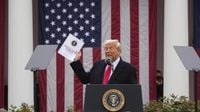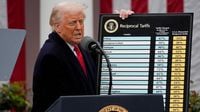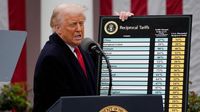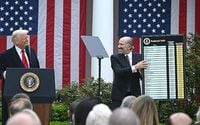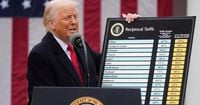On April 2, 2025, President Donald Trump declared a new era in U.S. trade policy, announcing a series of reciprocal tariffs aimed at countries he deems to have unfair trade practices. This bold proclamation, made from the Rose Garden of the White House, was heralded by Trump as "Liberation Day," a moment he claims will restore America's economic strength.
Starting from April 3, 2025, a base tariff of 10% will be imposed on all imports from various countries, increasing significantly for those deemed to be "worst offenders". China will face a staggering 34% tariff on its exports to the U.S., while the European Union (EU) will see tariffs rise to 20%. Great Britain, however, will only incur the minimum 10% tariff, a move that has drawn mixed reactions from across the Atlantic.
In his announcement, Trump emphasized the need for fairness in trade, stating, "For decades, the United States has been exploited by other nations, both allies and adversaries. No longer will we be taken advantage of." He also highlighted that the U.S. imposes only a 2.4% tariff on motorcycles, while other countries impose tariffs as high as 75%, indicating a significant imbalance in trade practices.
Ursula von der Leyen, President of the European Commission, responded sharply to the new tariffs, warning that they would have "terrible consequences for millions of people around the world." She expressed readiness for the EU to react but also emphasized the importance of negotiation, stating, "It is not too late to engage in dialogue." Von der Leyen's comments reflect the EU's commitment to find a balanced response to Trump's aggressive trade measures.
The implications of these tariffs extend beyond mere percentages; they are expected to disrupt supply chains and increase costs for consumers globally. Von der Leyen noted that the tariffs would exacerbate inflation, particularly affecting vulnerable populations who may struggle with rising prices for essentials.
In the wake of Trump's announcement, Asian markets reacted negatively, with significant declines in stock prices in Tokyo, Hong Kong, and Seoul. The price of gold surged to a record high of $3,157, as investors sought safe havens amid fears of a prolonged trade war.
China's Ministry of Commerce promptly condemned the tariffs, urging the U.S. to cancel them immediately, warning that they threaten global economic development and disrupt international supply chains. "There are no winners in a trade war," the ministry stated, echoing concerns that Trump's tariffs could lead to a cycle of retaliation.
In the U.S., Democratic leaders criticized the tariffs as detrimental to American families, with Senate Minority Leader Chuck Schumer stating, "Americans should be outraged. This is a massive tax on families that benefits billionaires." Other Democratic senators echoed these sentiments, arguing that such tariffs will hinder economic growth and lead to job losses.
The response from the EU has been swift, with plans for a two-phase retaliation strategy. The first phase will address existing tariffs on steel and aluminum, while the second phase will involve a broader assessment of the impact of Trump's new tariffs and a coordinated response from EU member states.
Prime Minister Giorgia Meloni of Italy described the U.S. tariffs as a "mistake" and emphasized the need for diplomatic efforts to avoid a trade war. She expressed concern that escalating tensions could weaken the West's position in the global market.
In Canada, Prime Minister Mark Carney warned that the new tariffs could radically alter global trade dynamics. He promised a strong response to protect Canadian interests, highlighting the interconnectedness of North American economies.
As the situation unfolds, it is clear that Trump's tariffs are not just a domestic issue but a global one, affecting alliances and economic relations worldwide. The EU has signaled its intent to stand united against what it perceives as unjust trade practices, with von der Leyen stating, "Our unity is our strength. If you strike one of us, you strike all of us." This sentiment resonates as European leaders prepare for a coordinated response.
The economic fallout from these tariffs is expected to be significant, particularly for sectors heavily reliant on exports to the U.S. The Copa-Cogeca, representing European agricultural enterprises, warned of dire consequences for global trade flows, including increased prices and supply chain disruptions.
As the U.S. prepares to implement these tariffs, the global community watches closely. The potential for retaliatory measures looms large, with countries like Japan and Australia already expressing their discontent over the new tariffs. Japan's Minister of Commerce, Yoji Muto, labeled the tariffs "extremely deplorable," indicating a willingness to challenge them through international trade agreements.
In summary, Trump's announcement of reciprocal tariffs marks a significant shift in U.S. trade policy, with far-reaching implications for international relations and the global economy. As nations brace for the impact, the call for diplomatic dialogue and negotiation remains a critical factor in preventing an all-out trade war.
